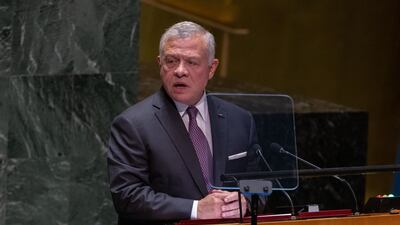Follow the latest news from UNGA
Jordan's King Abdullah II on Tuesday called on the international community to do more to support refugees in his country, where one third of the population have fled protracted conflicts and wars.
Speaking before the UN General Assembly, King Abdullah said Jordan has exceeded its capacity to accommodate and provide for nearly 1.4 million Syrian refugees, almost half of whom are under the age of 18.
“Jordan's capacity to deliver necessary services to refugees has surpassed its limits,” he said.
“Syrian refugees' future is in their country, not in host countries.”
But refugees from Syria, he said, can only return home after a resolution to the conflict, now more than 12 years old. He added that Jordan would continue to safeguard its national security against any potential threats arising from the crisis.
“The fact is, refugees are far from returning,” King Abdullah explained.
“On the contrary, more Syrians are likely to leave their country.
“Jordanians are serious about our duty to those in need. We have done everything we can to secure a dignified life for refugees.”
Several UN agencies that provide vital services to help meet the needs of refugees have in recent months faced shortfalls in funds, forcing them to cut their support, King Abdullah noted, returning to a theme that Secretary General Antonio Guterres spoke of earlier in the day.
The monarch called on the global community to seek a political resolution to the conflict, in accordance with UN Security Council resolution 2254, which calls for the establishment of a credible, inclusive and nonsectarian governance, a process for drafting a new constitution as well as free and fair elections under UN supervision.
He also addressed the Palestinian-Israeli conflict, which he called the primary issue of the region.
“Our region will continue to suffer until the world helps lift the shadow of the Palestinian-Israeli conflict, the central issue in the Middle East, no architecture for regional security and development can stand over the burning ashes of this conflict,” he continued.
He said five million Palestinians are living under occupation and have no civil rights, no freedoms of mobility and no say in their lives.
“Yet every UN resolution since the beginning of this conflict recognises the equal rights of the Palestinian people to a future of peace, dignity and hope” he said.
He lashed out at Israel for depriving the Palestinian people of the same right as Israelis to express and fulfil their own national identity.
King Abdullah appealed to world leaders to protect young Palestinians from extremists who “prey on their frustrations and hopelessness by making sure they continue to learn at the schools under the blue flag of the United Nations, as the alternative will be the black flags of terror, hate and extremism”.
Also speaking to the General Assembly, Qatar's Emir Sheikh Tamim condemned what he called a “brazen and conspicuous apartheid system in the 21st century” in the occupied West Bank and Gaza.
“It is unacceptable for the Palestinian people to continue to languish under the yoke and the intransigence of the Israeli occupation and the rejection by consecutive Israeli governments of any just political solution according to international legitimacy,” he told the General Assembly.
Sheikh Tamim said Israel has responded to US-led initiatives to normalise relations between Israel and Arab countries under the Abraham Accords with “more nationalist and ultra-Orthodox intransigence and extremism”.
On Syria, he said “it is unacceptable to condone the injustice sustained by the fraternal people of Syria as destiny”.


